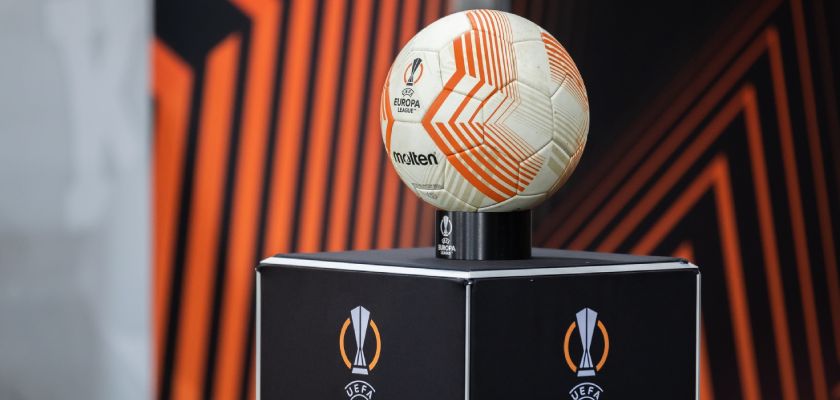To start understanding all about the UEFA Europa League, also known as the UEFA Europa League, it’s important to know that we’re talking about the second most important club tournament in Europe, second only to the Champions League. But make no mistake, the excitement of the matches is also guaranteed.
And to start debunking the myth that the Europa League is “weaker”, it’s worth saying that even the biggest teams in Europe don’t usually fall to smaller teams in the UEFA Europa League;
For example, in 2018, the mighty Atlético de Madrid was eliminated by the modest Lokomotiv Moscow. Who knows, maybe your favorite team will surprise you this year?
Participate in our free WhatsApp community and receive daily tips, news and trivia on more than 50 sports! Click here to join.
What is the Europa League?
The Europa League, formerly known as the UEFA Cup, is a soccer club competition organized by UEFA. It is the second most prestigious club tournament in Europe, behind the UEFA Champions League. Clubs from all over Europe compete to win the cup and a place in the Champions League.
In other words, according to the rules of the Europa League, the winner is guaranteed a place in the group stage in the following season of the Champions League, the most competitive and sought-after club championship in Europe;
In addition, since 2000, the team that wins the Europa League takes part in the UEFA Super Cup against the Champions League winner.
In 2023, the competition was contested between Manchester City and Sevilla, with the match tied in regulation time. The English team, however, won on penalties and took home the Super Cup. Check out the best moments!
But back to the history of the UEFA Europa League, its first edition took place in 1971, but it was only renamed in 2009. Until then, the championship was called the UEFA Cup.
Evolving over the years, the tournament has gained in popularity and prestige throughout the world, which has turned its eyes to Europe, its teams and great stars.
How does the Europa League work?
The Europa League starts with 32 clubs divided into 8 groups. The four teams in each group play each other and the top two go through to the next stage, a knockout stage with back-to-back games, until they reach the final, played in a single match.
How will the Europa League work in 2025?
The 2024/25 season will see some new changes to the Europa League rules. The first of these is the fact that four more teams will reach the final stage. But let’s break it down;
League stage
In the first stage, all 36 teams will be placed in a single group and the matches will be decided on the basis of a draw that will divide the teams into four “pots.” In other words, each pot will have 9 teams;
According to UEFA Europa League rules, each club will face two teams from each pot (from their own and the other “pots”), one match at home and one away. At this stage, clubs from the same country will not play each other.
Knockout stage
After all the matches in the first phase of the UEFA Europa League have been played, 24 teams have qualified for the knockout stage. However, the top eight teams advance directly to the round of 16;
The 9th to 16th-placed teams, meanwhile, will face each other in what has been called a “preliminary playoff”;
Vacancy for Champions League losers
Here’s one of the biggest changes to the Europa League rules:no team eliminated from the Champions League will play in the Europa League.
If you’re just getting to know how the Europa League works, you might not know, but until the 2023/2024 season, some of those eliminated from the Champions League group stage were redirected to the Champions League. This will no longer be the case.
Curiosities about the Europa League
Which teams have won the Europa League the most?
Undoubtedly, knowing all about the UEFA Europa League involves knowing the teams that have won the most Europa Leagues:
- Sevilla (ESP) – 7 wins
- Liverpool (ING) – 3 wins
- Juventus (ITA) – 3 wins
- Inter Milan (ITA) – 3 wins
- Atlético de Madrid (ESP) – 3 wins
As you can see, giants of world soccer are important names for the competition;
What are the Europa League prizes?
The prize money for the UEFA Europa League is 4 million euros (R$20.8 million) for the champion, plus:
- Qualified for the final: 4.6 million euros each
- Qualified for the semis: 2.8 million euros each
- Quarter-finalists: 1.8 million euros each
- Qualified for the Round of 16: 1.2 million euros each
- Playoff qualifiers: 500,000 euros each
Even though it’s considered a less prestigious competition than the Champions League, once you learn all about the Europa League, you’ll realize that it’s not such a second-rate prize, right? lol
It’s worth mentioning that the clubs that enter the group stage also receive prize money, around 3.63 million euros (around R$18.9 million at the current price), as well as bonuses like:
- 630,000 euros for winning the group stage
- 210,000 euros for a draw in the group stage
The prizes also vary according to the team’s position in the standings. Thus, the team that finishes 1st in the group will receive 1.1 million euros (R$5.7 million) each, and the team that finishes 2nd in the group will receive 550,000 euros (R$2.8 million) each.
What are the Europa League’s greatest records?
Check out some of the UEFA Europa League records!
Top scorers
- Alan Shearer (Inglaterra): 23 goals (1992-2006)
- Henrik Larsson (Sweden): 20 goals (2004-2009)
- Radamel Falcao (Colombia): 18 goals (2010-2017)
- Klaas-Jan Huntelaar (Holanda): 18 goals (2008-2017)
- Giuseppe Rossi (Italy): 17 goals (2005-2013)
Players with the most games in the Europa League
- Frank Lampard (England): 137 games (2004-2015)
- Xabi Alonso (Spain): 118 games (2005-2017)
- Iker Casillas (Spain): 117 games (2001-2018)
- Sergio Ramos (Spain): 110 games (2005-2021)
- Andrés Iniesta (Spain): 109 games (2006-2018)
Biggest goals in the UEFA Europa League
- Sevilla 11-0 Maltese Crusaders (2009/10)
- Liverpool 8 x 0 Shamrock Rovers (2010/11)
- APOEL 6 x 0 HJK (2014/15)
All about the UEFA Europa League: it’s time to start cheering!
Now you have a guide to all about the UEFA Europa League and you can start cheering;
The 2024/2025 Europa League season starts in July 2024 and has its final scheduled for May 2025.
As you’ve seen, even though the Europa League is a lesser-known tournament than the Champions League, we’re undoubtedly talking about a very strong competition, with players who play elite soccer. That’s why it’s worth following and, who knows, choosing your European team of heart!
We hope this guide with all about the UEFA Europa League has encouraged you to follow the championship, and to stay on top of all the information about the international (and national) leagues, join our free community on WhatsApp and receive daily tips, news and curiosities from more than 50 sports!Click here to join.



